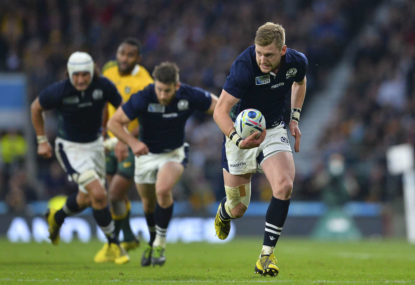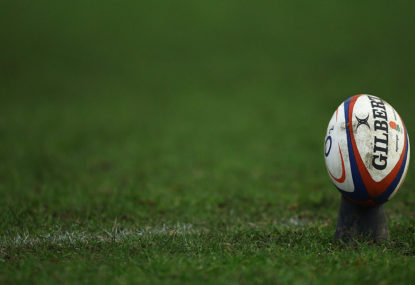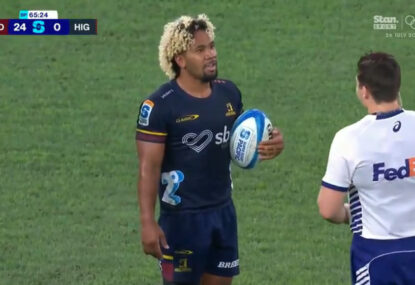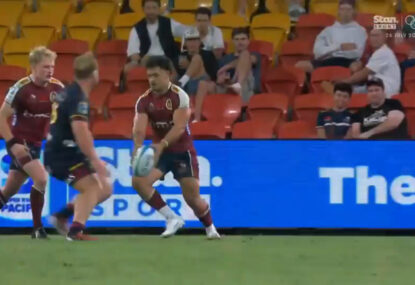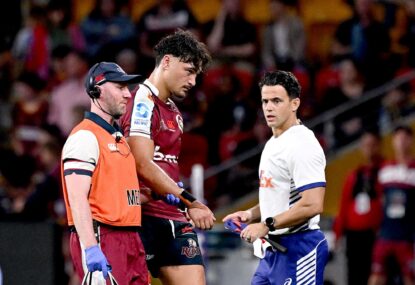This year’s Calcutta Cup game has got me excited. England are focused, but are they vulnerable?
Scotland are dangerous, but do they have the mentality to beat the second-best team in the world?
They didn’t show Wales enough respect by not putting points on the board when they had the chance. By half-time in the next game, they showed they were learning and kicked themselves to a masterful second-half performance that closed out a dangerous French side.
England are a different prospect. Reigning champions with a spiky head-coach and well-drilled units that possess leaders across the field.
England should win. But Scotland are at home, they have Greg Laidlaw and they have Stuart Hogg. The way I see it, the result of this weekend’s game will come down to four different areas.
No. 1: The lineout
Scotland’s game plan against Wales wasn’t as naïve as some commentators have suggested. Yes, they did tend to go from side to side when Stuart Hogg wasn’t on the ball, but they also kicked intelligently and pinned Wales back into their own 22 for the first half.
They had 60% territory and 54% possession in their favour, but they failed to convert, and the lineout was one of the causes.
They lost three lineouts, leaving them with a 79% completion rate on their own throw. What the stats don’t show you is that they lost these lineouts in Welsh territory, robbing their backs of attacking ball.
Couple that with Finn Russell’s alarming tendency to butcher penalty kicks to touch and that’s field position and possession they can’t afford to squander against a team like England.
If you’re curious, Scotland’s lineout success rate went up to 89% against France.
However, I see England, with Maro Itoje, Joe Launchberry, Courtney Lawes, Chris Robshaw and the ever-dependable Dylan Hartley exploiting the set-piece come Saturday.
Advantage England.
No. 2: Attacking the inside/outside channel
The Scottish attacking backline is literally two-pronged. Finn Russell will attack the line or wrap around. If he attacks the line, he looks for Huw Jones or Peter Horne to hit the defending inside shoulder at pace.
If he wraps he’s looking to layer the attack and create space between the defensive 13 and wing. In this space, usually travelling at some speed, is Stuart Hogg who Russell will look to float passes to.
The effectiveness of this strategy is reflected in the stats for Jones and Hogg.
Huw Jones attacking the inside shoulder of the defensive line has recorded 21 and 50 metres made in his first two games. However, for those metres, he has registered two players beaten against a resilient Welsh defence and an impressive four players beaten against France.
In comparison, Ireland’s Robbie Henshaw, rated as one of the best centres in the north, registered 20 metres and no defenders beaten against France.
Significantly, Jones is consistently getting across the gain-line in parts of the field he has no right to. In turn, he is sucking in bodies and reducing the defending side’s capability of neutralising the wrap around.

(AP Photo/Scott Heppell)
The consequence of this can be seen in Hogg’s stats. Against Wales he made 79 metres and beat three defenders. Against France, he made an impressive 123 metres while only beating two defenders.
The reason for this is the inside threat of Jones creates space in the channel outside the defensive 13. Hogg is free to charge down that channel knowing the defending wing needs to keep the width to halt an overlap leading to a try.
With Hogg’s pace, by the time the 15 has come across to stop Hogg the attacking line is behind the defensive line. At no point has Hogg needed to beat a defender as his pace and Russell’s distribution has done the damage.
Luckily for England, they have one of the best defenders of the 13 channel in Jonathon Joseph. Tellingly when Ben Te’o occupied this space Italy scored twice floating passes into that channel. Against Wales with Joseph on the field, England were tight.
Despite this I highly rate Hogg and Jones to make metres and beat defenders. The question is whether they will take the points once the ground has been made?
Advantage Scotland.
No. 3: The magic ten minutes
New Zealand destroys teams in ten minutes. It’s a beautifully brutal thing.
In the November international against Wales, the men in red were only trailing by one-point going into the 55th minute. By the 65th minute, they were buried 26-11.
Scotland were 3-3 in the 44th minute. Ten minutes later they were trailing 15-3. Not quite buried, but certainly on the floor.
When analysing New Zealand and why they are so good, Eddie Jones has repeatedly stressed intensity.
When they need to, the world champions can up their work rate; they’re off the deck quicker, they gang tackle, they don’t chase but swarm the opposition and once they are behind the gain-line through turnovers or line-breaks, they ruthlessly execute with unadulterated pace.
England isn’t there yet but they are fitter than they used to be. They have athletic forwards and wings that possess pace in abundance. In turn, they are starting to put together short periods of high intensity that are winning them games.
Against Australia, 18th November 2017. 72nd minute. England lead 13-6. Final score: 30-6.
Against Wales, 10th February 2018. Third minute: 0-0. 21st minute: 12-0.
Not quite as impressive, I know, but I’m not trying to claim England are as good as New Zealand yet.
What is true is that England are departmentalising game time and are looking for short periods where they can ramp up the intensity and see if the opposition cracks. Eddie Jones and his finishers were phase one of this tactic but that made the timing of the blitz predictable.
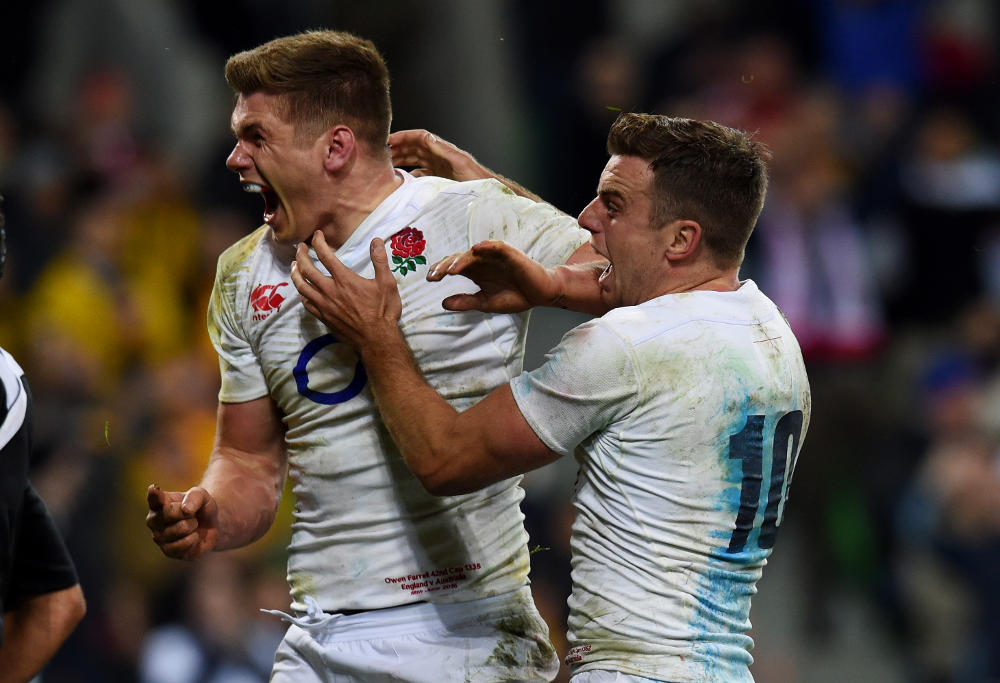
(AAP Image/Tracey Nearmy)
In response, they are trying to develop a system that can be initiated at will, like New Zealand.
The question is, if England blitz, will Scotland be able to regroup and come back at them? Last year they crumbled. But again, going back to the November NZ-Scots game suggests they may have the mental fortitude to ride out the storm and bounce back.
Advantage England (just).
No. 4: Greg Laidlaw – Finn Russell
Poor Finn Russell. I’ve never wanted a player to succeed more. For Glasgow he’s electric, but on the international stage he’s shown himself to be vulnerable to the pressure and will often rush things.
He needs to learn patience.
Luckily for Scotland, they have Greg Laidlaw. Solid as a rock and a perfect foil to a temperamental but potentially brilliant fly-half.
Gregor Townsend this week might have been tempted to favour a conservative Ali Price-Greg Laidlaw partnership but I’m glad he avoided such a move.
Without Russell’s distribution the potency of Hogg and Jones is dulled, and without those two attacking weapons, Scotland won’t score enough points to beat England.
However, Eddie Jones is ruthless when he senses weakness and he will have Maro Itoje et al chirping in Russell’s ear between plays and smashing down his channel the rest of the time.
But what fly-half isn’t used to lunkhead forwards barrelling down their channel thinking to intimidate them? If you’re playing modern-day international rugby, then you’re unquestionably tough and brave.
Instead it’ll be the situation that tests Russell’s mental fortitude, not the physicality of knuckle-dragging forwards.
Advantage: even.
Verdict
Gut says England. Head suspects Scotland. Heart says ‘please don’t rain!’






























































































